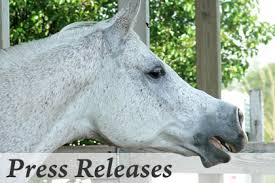Jaguar Animal Health Announces Positive Results from Proof-of-Concept Study of Neonorm in Foals
Product Launching at the American Association of Equine Practitioners Annual Convention December 5-9th
SAN FRANCISCO–(BUSINESS WIRE)–Nov. 16, 2015— Jaguar Animal Health, Inc. (NASDAQ:JAGX) (“Jaguar” or the “Company”), an animal health company focused on developing and commercializing first-in-class gastrointestinal products for companion and production animals, announced positive results today for its NeonormTM Foal proof-of-concept study. NeonormTM Foal is a non-drug product comprised of an orally-administered paste formulation of a standardized botanical extract derived from the Croton lechleri tree, in combination with a third-party probiotic.
The objective of the randomized, multi-site, blind-controlled study was to evaluate the safety, tolerability, and efficacy of NeonormTM Foal for treatment of foals suffering from secretory or watery diarrhea. Sixty foals participated in the study, which consisted of a 72-hour treatment period followed by an observation period. Each participating foal was placed into one of three groups: a group that received treatment twice a day (the BID group), a group that received treatment four times a day (the QID group), and a placebo-treated group. Physicals, ultrasounds and the collection of blood samples took place at intervals throughout the study, which took place in Argentina during foaling season.
During the treatment period, 68% of foals in the BID group were identified as clinical responders versus 35% of placebo-treated foals, with a p-value of 0.03. For the purposes of the study, clinical responders were defined as foals that achieved a formed stool by the end of the reported period. Within the period that included treatment and 24-hours of observation, 79% of foals in the BID group were identified as clinical responders versus 47% of placebo-treated foals, with a p-value of 0.03. At the 120-hour point for a subset of the QID group which was comprised of the sickest foals enrolled in the study-animals that would be expected to take longer to recover-statistically significant results indicated that sicker foals may benefit from more frequent treatment. Within the period that included treatment and 48-hours of observation, 94% of foals in this QID group subset were identified as clinical responders versus 46% of placebo-treated foals, with a p-value of 0.02
Create a free account with TheHorse.com to view this content.
TheHorse.com is home to thousands of free articles about horse health care. In order to access some of our exclusive free content, you must be signed into TheHorse.com.
Start your free account today!
Already have an account?
and continue reading.
Written by:
Press Release
Related Articles
Stay on top of the most recent Horse Health news with













